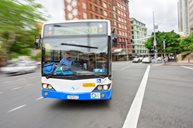When you spend so much time off the ground and flying planes locally, interstate or overseas, you need to stay focused on the job at hand. But eventually it's time to come down to Earth and address everyday facts of life, like doing your taxes. It might seem a bit dull compared to flying high, but it's actually a great opportunity for you to legitimately get back some of your hard earned salary.
The key to getting the best result is having the best support, in the form of an expert tax agent like the ones who work at H&R Block. These experienced professionals know everything there is to know about tax, and will make sure you get all the deductions you are eligible for as a pilot – which will hopefully mean a much better refund in the end!
To complete your return as a pilot, you'll first need an income statement from your employer (previously called a "payment summary" or "group certificate"). This is a summary that outlines all of your salary, wages, allowances and bonuses for the financial year.
You won't need to have a copy of this statement, as it should be lodged by your employer directly to the ATO. Once this has been lodged, we can download the information for you and then help you work out your deductions.
What do I need to know about claiming deductions?
As you know, you're entitled to claim deductions on any money spent during the financial year on products or services that directly related to earning an income. But there are two things you need to remember:
- First, you need to have spent the money yourself (it can't have been reimbursed by your employer), and
- Secondly, you need to keep a record of the expense such as a receipt or invoice.
What deductions can I claim?
There is a wide range of deductions you can claim as a pilot, such as:
- Any expenses connect to buying, repairing and cleaning any work clothing items that are either part of your official uniform or distinctive to your company (such as a shirt with a company logo on it)
- Car expenses, including parking costs and tolls, if you travel between different jobs on the same day (for example from your day job as a pilot to a second job as a cadet trainer) or to different locations for your work, such as from the head office to the airport
- Any costs related to purchasing rehydrating moisturisers and hair conditioners specifically used to reduce the effects of the abnormally dry conditions of an airplane cabin
- Self education costs for attending any courses, training or seminars specifically related to your current line of work, such as updating your first aid certification or attending a training course on new aircraft technology to reduce turbulence
- The cost of renewing licences you hold specifically for your employment, such as a pilot's licence, but not the cost of getting it in the first place
- Any union and professional association fees
- Salary guarantee and loss of licence insurance where the payment under the policy will be assessable income to replace lost earnings
- Meals when you're travelling away from home overnight for work, and overtime meals when your employer pays you an overtime meal allowance under an industrial law, award or agreement
- Travel expenses such as accommodation if you are travelling for work and need to stay away from home overnight, and pay these expenses yourself
- Any expenses related to buying, hiring, repairing and cleaning any items of clothing that are part of a uniform and required for your work
- The cost of buying luggage, suitcase trolleys, navigation bags or carry bags used specifically for work-related travel (for items that cost more than $300 the deduction must be spread over the effective life of the item)
- Any costs associated with securing visas required to enter any country you're visiting for work
- Journals, periodicals and magazines that are specifically related to your job as a pilot
- Any costs incurred doing medical examinations (including regular aviation and medical appointments and examinations required by the Civil Aviation Safety Authority) that you need to take to fulfill your health assessment requirements for the renewal of your work-related licences
- Phone and internet expenses for any work-related usage on your personal phone or device, provided they are not already covered by your employer
What can't I claim?
There are several key expenses you can't claim, including:
- Any regular clothing worn to your workplace that could also be worn outside of work (such as jeans or a white t-shirt) even if you only wear it for work and bought it specifically to wear to work; this includes regular clothing bought deliberately to look like a passenger when paxing, such as a business suit, and any watches or timepieces
- The cost of any meals or snacks consumed during the course of a normal work day, even if you are given an allowance by your employer to cover the meal expense
- Any grooming costs, including hairdressing services and buying items of make up, even if it's a requirement of your job to be well presented
- The cost of renewing your driver's licence, even if having it is a condition of your employment
- Any fines that are incurred during your work day, including a fine from the Civil Aviation Safety Authority (CASA) for failing to record all the necessary information in the flight technical log for the aircraft you are flying or failing to comply with a CASA direction
- The cost of buying any gaming consoles or flight simulator games
- The cost of purchasing prescription glasses or contact lenses, unless they're anti-glare glasses if you wear them to reduce the risk of illness or injury while working in your job as a pilot
- Any costs incurred when travelling between your home and your workplace, including parking fees or tolls, even if you live a long distance away or are on call and have to come in for a shift at the last minute
What records do I need to keep?
When you're coming in for a landing at tax time, you'll need good documentation to back you up. So you need to stay on top of your paperwork and have a comprehensive set of receipts if you want to get a good tax refund. It's a smart idea to create an easy and reliable system to help you keep on top of this throughout the year.
Remember, you don't need to keep physical receipts, and it's acceptable to keep a digital copy (such as a photo of a receipt or an email receipt) provided it is possible to read:
- The name of the supplier
- Amount of the expense
- Nature of the goods or services
- Date the expense was paid
- Date of the document
You also don't need to keep receipts for expenses under $10 (as long as these don't cumulatively come to more than $200) or any expenses where it is not possible to get a receipt. However, you will need a diary record of these expenses.
What happens if I make a mistake in my tax return?
Like any big issue, we strongly recommend dealing with it as soon as possible. It's essential that you take great care in putting together the information and supporting documentation when filing your tax return, and only claim deductions that are genuine to avoid penalties and possibly even prosecution from the ATO.
It's easy to make innocent mistakes sometimes, and if you lodge yourself and realise you've submitted incorrect or unsubstantiated claims then you should contact H&R Block immediately and we will assist you in making the necessary amendments.
Still have some questions about lodging your tax return? Talk to H&R Block. Our experienced tax consultants will be able to help. Call 13 23 25 for details or find your nearest office and book an appointment online.




.png?width=55&height=48&ext=.png)
-1.svg)

